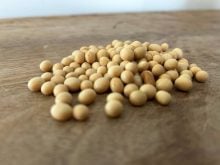Moscow | Reuters — Russia’s agriculture ministry has proposed that the government reduce or cancel its wheat export tax due to rouble volatility and a decline in global wheat benchmarks, the Interfax news agency reported, citing first deputy minister Evgenii Gromyko.
The rouble has lost about six per cent against the U.S. dollar since the start of December on sliding oil prices and has triggered a rise in Russia’s floating wheat export tax.
“Our domestic price is not lagging global prices in general, there is a trend today — the global prices decrease…,” Gromyko told reporters in the southern region of Krasnodar on Monday.
Read Also

U.S. grains: CBOT soybeans, corn, wheat fall in USDA data aftermath
Chicago grains took a dive on Friday, following a closely watched U.S. government crop report and the release of export data that could provide clues into Chinese buying.
“That is why our task is to decide the question on the export tariff — either its downgrade or setting it to zero,” Interfax quoted him as saying.
He said the government will consider the ministry’s proposal in January. The ministry did not confirm the proposal and declined to provide further details when contacted by Reuters.
The wheat export tax is currently set at 50 per cent of the customs price minus 6,500 roubles (C$127) per tonne, but not less than 10 roubles per tonne.
With the rouble rate against the U.S. dollar at 71 and wheat prices in the Black Sea at US$192.50 per tonne free-on-board (FOB), the tax is 334 roubles (C$6.54) a tonne.
The agriculture ministry sees the country’s grain exportable surplus at 30 million tonnes this 2015-16 marketing year, which started on July 1.
Russia has already exported 18.6 million tonnes of grain, including 14 million tonnes of wheat, according to its data. The pace of grain exports are down five per cent year-on-year.
— Reporting for Reuters by Polina Devitt in Moscow.














